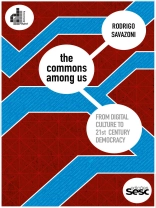In the third volume of the Digital Democracy series, Rodrigo Savazoni, a journalist with a master’s degree in Social Sciences, investigates the development of the idea of commons from the expansion of digital connection networks in the late 1990s. Part of the human experience and of community life, the idea of commons is defined by the author through both the management and sharing of resources within a community and the relationship between nature and culture established in the practice of such sharing. To locate the potential and scope of the idea of commons, Savazoni draws on examples ranging from public spaces of coexistence in cities to natural resources such as oceans and air to free software and free protocols that structure networks like the internet. Besides referring to the work of authors like Antonio Negri, Michael Hardt, Christian Laval, Pierre Dardot, Eduardo Viveiros de Castro, Bruno Latour, Silvia Federici and Elinor Ostrom, Rodrigo Savazoni supports his observations with practical examples gathered in cities such as São Paulo, Recife, Madrid, Naples and Bologna, and from different Amerindian cultures. Published exclusively in digital format, the Digital Democracy series is edited by the professor and sociologist Sergio Amadeu da Silveira.
Yazar hakkında
Rodrigo Savazoni is a journalist, writer and cultural producer. He is one of the directors of Instituto Procomum (IP) and was one of the founders of Casa da Cultura Digital. Creator of the Cultura Digital.Br festival and of the Produção Cultural no Brasil project, he was chief of staff of the São Paulo Municipal Culture Department (2013). He is the author of the books Cultura Digital.br (Azougue, 2009), together with Sergio Cohn, and Os novos bárbaros: a aventura política do Fora do Eixo (The New Barbarians: The Political Adventure of Fora do Eixo – Aeroplano, 2014). He holds a Master’s degree in Human and Social Sciences from the Federal University of ABC and is a doctoral student at the same institution, developing research on culture, technology and contemporary cultural dynamics.












